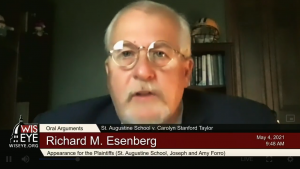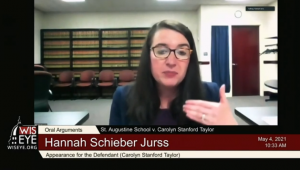Certified question before state Supreme Court seeks clarity on private-school busing requirements
By: Michaela Paukner, [email protected]//May 4, 2021//
Certified question before state Supreme Court seeks clarity on private-school busing requirements
By: Michaela Paukner, [email protected]//May 4, 2021//
Busing services for children attending private religious schools figured at the center of a certified question before the Wisconsin Supreme Court on Tuesday.
The court heard oral arguments about St. Augustine School v. Carolyn Stanford Taylor, a case that’s gone up to the U.S. Supreme Court and back in the past five years.
The case started in 2016 in Washington County circuit court. Two parents who lived within the Friess Lake School District were denied transportation for their kids to St. Augustine School in Hartford. The district rejected the request because the family lived within the attendance area for another Roman Catholic school, which is the same religious denomination as St. Augustine.
St. Augustine and the parents disputed the affiliation and sued the district and Tony Evers, who was then state superintendent. The complaint alleged that there had been violations of the parents’ and school’s First Amendment rights. The Eastern District granted summary judgment in favor of the state, and the plaintiffs appealed to the Seventh Circuit.
The Seventh Circuit initially affirmed the decision, but the U.S. Supreme Court remanded the case to the Seventh Circuit for it to be reviewed in light of the decision in Espinoza v. Montana Dept. of Revenue in 2020.
In that case, the Seventh Circuit certified a question to the Wisconsin Supreme Court about how to determine whether two or more schools are private schools affiliated with the same religious denomination for purposes of Wis. Stat. 121.51. The statute says the attendance areas of private schools affiliated to the same religious denomination shall not overlap.

The state Supreme Court heard oral arguments about the issue on Tuesday. The justices are being asked to decide whether the state superintendent should make decisions in such instances by relying exclusively on neutral criteria, such as ownership, control and articles of incorporation, or if the superintendent can also take into account the school’s self-identification on its website and other sources.
Rick Esenberg, counsel for St. Augustine, said the school was denied transportation benefits because the SPI had made a religious judgment. He argued that the state needs to rely on secular and neutral criteria when making a decision, which can include a number of different things, but nothing involving a religious judgment by the state.
“Because we don’t want courts and governments getting involved with religious judgments, they have to accept what religious adherents tell them about those religious descriptors,” Esenberg said.

Hannah Schieber Jurss, who appeared for the state, argued that the court should use schools’ own outward determinations of their religious affiliations when making decisions, which is what the state did in its decision about St. Augustine.
“It’s not the government drawing those connections,” Schieber Jurss said. “It is the school itself. The government is not assigning what St. Augustine refers to as the titles. The organization is.”
She said to answer the certified question, the court only needs to recognize that denomination is a broader term than corporation.
The state justices also asked the parties to discuss whether they should revisit the court’s decisions in State ex rel. Vanko v. Kahl in 1971 and Holy Trinity Community School v. Kahl in 1978. In Vanko, the state Supreme Court construed 121.51 to apply to any two private schools affiliated or operated by a single sponsoring group, such as the same religious denomination.
Several of the justices dug into the added question during oral arguments. Justice Pat Roggensack said she didn’t think the parties had properly discussed it during briefing.
“That’s my concern today,” Roggensack said. “I’m concerned about Vanko because it seems to cause a continuing problem.”
Esenberg said Vanko wasn’t properly applied in this case. But even if it had been, it wouldn’t be a problem.
“Properly read, Vanco and Holy Trinity … permit looking only at the secular connections,” Esenberg said, “and I would argue that has worked for the most part because Holy Trinity was 50 years ago, and for 50 years, the statutory scheme has operated, and we haven’t had these kinds of problems.”
Schieber Jurss said the Vanko court determined the Legislature’s intention was to provide transportation to students in a reasonably uniform matter by prohibiting overlapping attendance areas.
“This court said the purpose is to make clear that when we’re talking about religious private schools, the metric is not operation by a single agency, a single set of trustees, or a single religious order,” Schieber Jurss said. “It is a broader term.”
Tuesday marked the first oral arguments with Annette Ziegler as chief justice. She recognized Roggensack’s service to the court and the state before the proceeding started.
“Her colleagues and the people of this great state have been the beneficiaries of her keen intellect, her ability to meet any situation with dignity and with grace, and I’m proud to call her my colleague and my friend,” Ziegler said. Follow @WLJReporter
Legal News
- Some State Bar diversity participants walk away from program
- Wisconsin court issues arrest warrant ‘in error’ for Minocqua Brewing owner
- Iranian nationals charged cyber campaign targeting U.S. Companies
- Facing mostly white juries, are Milwaukee County defendants of color truly judged by their peers?
- Milwaukee Mayor speaks in D.C. Tuesday at White House water summit
- Chicago man sentenced to prison after being caught with ‘Trump Gun’
- FTC bans non-competes
- Gov. Evers seeks applicants for Dane County Circuit Court
- Milwaukee man charged in dismemberment death pleads not guilty
- Democratic-led states lead ban on the book ban
- UW Madison Professor: America’s child care crisis is holding back moms without college degrees
- History made in Trump New York trial opening statements
WLJ People
- Power 30 Personal Injury Attorneys – Russell Nicolet
- Power 30 Personal Injury Attorneys – Benjamin Nicolet
- Power 30 Personal Injury Attorneys – Dustin T. Woehl
- Power 30 Personal Injury Attorneys – Katherine Metzger
- Power 30 Personal Injury Attorneys – Joseph Ryan
- Power 30 Personal Injury Attorneys – James M. Ryan
- Power 30 Personal Injury Attorneys – Dana Wachs
- Power 30 Personal Injury Attorneys – Mark L. Thomsen
- Power 30 Personal Injury Attorneys – Matthew Lein
- Power 30 Personal Injury Attorneys – Jeffrey A. Pitman
- Power 30 Personal Injury Attorneys – William Pemberton
- Power 30 Personal Injury Attorneys – Howard S. Sicula











